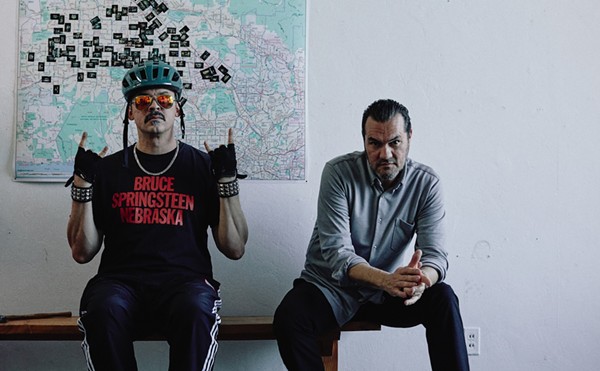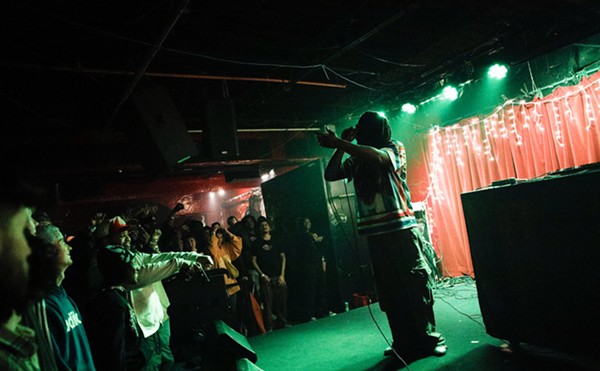Former House of Pain frontman Everlast started recording as a freshly dressed solo artist on 1990's Forever Everlasting. In 1992, he resurfaced as a member of the gritty rap trio House of Pain. The Irish-themed group scored a monster single with "Jump Around," which still turns up in clubs, sports events and commercials. That song's success sometimes incorrectly relegates House of Pain to the one-hit wonder pile, though the band sparked the rap-rock movement with a remix of "Shamrocks and Shenanigans" by Nirvana producer Butch Vig. They went gold with 1994's dark and relentless Same As It Ever Was, despite the absence of a hit single. Everlast pulled the plug on House of Pain immediately after the release of 1996's Truth Crushed to Earth Shall Rise Again, which sank without a trace.
The MC staged a comeback on 1998's Whitey Ford Sings the Blues. The double-platinum album gestated between a spiritual awakening and near-death experience. After House of Pain went up in flames, Everlast converted to Islam. Just after he finished recording the disc, a previously undetected congenital heart defect nearly killed him. On tracks like the hit ballad "What It's Like," the maturing rhymer rapped, sang and played guitar, mashing up hip-hop, Southern rock and folk country.
In 1999, he won a Best Rock Performance Grammy for the gruff "Put Your Lights On." The momentum sent 2000's Eat at Whitey's to gold status. As that album sputtered, Everlast became embroiled in a feud with Eminem, the new king of white hip-hop. Everlast then signed to Island/Def Jam for 2004's flat White Trash Beautiful, which came and went unnoticed. This year, Everlast is back in the spotlight. He earned an Emmy nomination for the theme to the TNT drama Saving Grace. And he's taking care of unfinished business in the pop world. All three members of House of Pain contribute to the upcoming debut album by La Coka Nostra, a group of hip-hop superfriends.
Between records, Everlast kept busy performing live shows with longtime producer and friend DJ Muggs (who's a member of Cypress Hill). The gigs led to the surprising first single from the new Love, War and the Ghost of Whitey Ford, a cover of Johnny Cash's "Folsom Prison Blues," with a rejuvenated Everlast spitting over the beat from Cypress Hill's "Insane in the Membrane." To promote the record, he's touring with a rock-band quartet, playing songs from his whole career. In a recent phone interview, he talked about his ups and downs. Ê Where was your head at for the first Whitey Ford record?
I wrote that after House of Pain came apart, watching my man Danny Boy [House's second rapper] get mixed up in drugs, and having the whole world in my hands and watching it turn bad, and thinking about what else there was. I've always thought about my spirit and life and death and been aware of things like that, and been drawn to them.
Ê Did your heart attack set the tone for the album?
No. It was done before that. I was living with my producers. And the only reason I'm here is because they heard my breathing getting shallow. They called the ambulance, I got the right doctor Ð or I would have been John Ritter. And I think on a subconscious level, I knew that was coming, like my body or spirit was talking to me. Like death was near. Ê
Do you think White Trash Beautiful worked?
I liked the record. If I didn't like 'em, I wouldn't call 'em finished and turn it in. I personally don't think the record got any chance. They did the bare minimum they had to do contractually. And made it very clear they didn't give a fuck. So that's why it took me so long to get back in the groove. It really broke my heart.
Ê To me, what's most impressive about Eat at Whitey's was that it doesn't have a half-assed rewrite of "What It's Like."
Everybody wanted another "Jump Around" on the second House of Pain album. We had a huge success, and we wanted to keep our credibility, like, "Let's make a dark, underground-ish kind of record." Making an album and having it sell a million or two records, that's one of the best things in the world. But when I leave this planet, I want people to be able to look at the work, and [say], "Wow. Like it or not, the guy did a lot of different shit. The guy stuck his hands in whatever he felt like stickin' his hands in." Ê
Do you feel like you came out of the Eminem feud OK, like you got your licks in?
I really don't reflect on it. As far as I'm concerned, it is what it is. I said what I said. I think out of anybody that ever went rhyme for rhyme with him, I gave the best run for his money.
Ê Is La Coka Nostra not a House of Pain reunion, even though all three of you are on the album?
You definitely could say, yeah, it is, because we're all there. But also, it's a new thing. It's fun. When La Coka Nostra play live, we definitely do a bunch of House of Pain stuff. Will there be another record? I don't know. If there was one, it would probably be only one more, and it would be to end things on a good note. Ê
Do you think House of Pain gets its props?
I think we're overlooked a little bit, for some of the doors we opened and some of the things we did. I think a lot of people didn't want to acknowledge it, because we were the first white group that came out just happy to be white. Even now, motherfuckers got to walk the line a little bit: "We're down, we're down." Ê With the new album, I pulled up your MySpace page and saw "Folsom Prison Blues." Before the music started, I thought, "Man, I don't know about this …"
A lot of people are like that. Some people think I'm messing with Jesus there or something. That's why I actually took that song to [Cash's son] John Carter Cash before I put it on my album and got his OK.
Ê What will you be doing 10 years from now?
I always want to make records. I always want to write songs. But lately, the scoring things are starting to come around for me. I'm a big fan of guys like [composers] Lalo Schifrin and Danny Elfman. That's amazing, that you can make a movie better because of what you did for it. Ê
Do you think the white guy in rap is a permanent fixture?
[The idea of] a white rapper is no crazier today than a black president.












